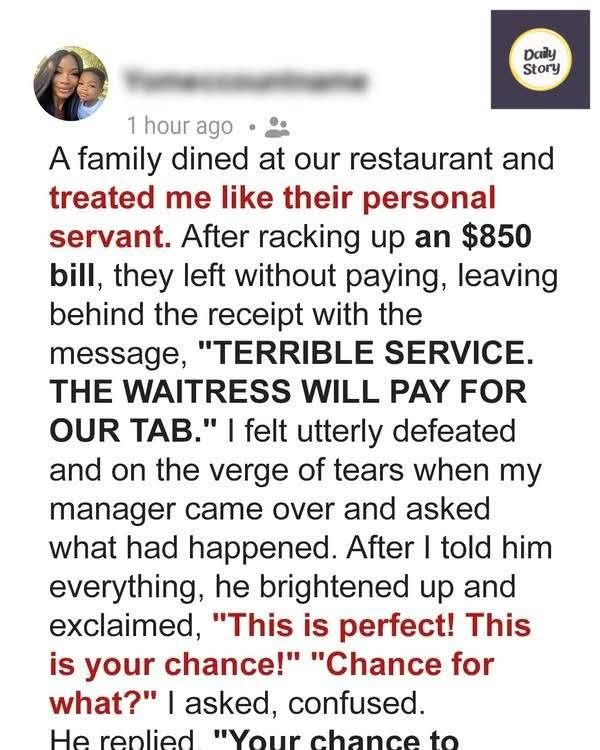A Family Criticized My Service and Left the Restaurant Without Paying an $850 Bill — but I Turned It to My Advantage –
It was meant to be just another typical Friday night shift at the restaurant, but it quickly transformed into an unforgettable whirlwind. The dining room was bustling, and I was managing three tables, striving to keep everyone satisfied. That’s when the Thompsons arrived, and everything went downhill from there.
Mr. Thompson strode in first, a large, commanding figure whose sense of entitlement seemed to fill the room before he even uttered a word. His wife followed in an extravagant floral dress, and their two teenage kids trailed behind, glued to their phones. From the moment they walked in, I sensed trouble was brewing.
“We want the best table by the window,” Mr. Thompson ordered. “And bring some extra cushions. My wife shouldn’t have to suffer in these awful chairs.”
I checked the reservations list. The table he desired had just been cleaned for another party, but reasoning with him was futile. “Of course,” I replied with a strained smile, rushing to make the necessary arrangements.
Once they were seated, the complaints started immediately. Mrs. Thompson wrinkled her nose. “Why is it so dim in here? Are we expected to eat in the dark?”
I adjusted the light on their table, hoping to improve the situation. “How’s this?”
“Barely better,” she replied dismissively. “And ensure my glass is spotless. I don’t want any lipstick stains on it.”
The rest of the night followed suit. Mr. Thompson snapped his fingers for my attention, sent his steak back for being “overcooked,” and loudly proclaimed the service was “the worst he’d ever had.” Mrs. Thompson pushed her soup away, claiming it was too salty. Even the kids chimed in, complaining about slow Wi-Fi.
By the time dessert arrived, I was emotionally exhausted. As I approached their table with the bill, I noticed they were gone. Initially, I thought they might have stepped outside, but then I spotted the napkin they left behind: “Terrible service. The waitress can cover our tab.”
My heart sank. Their bill was $850.
I clutched the napkin, grappling with the audacity of it all. My hands shook as I approached Mr. Caruso, our manager. He was busy attending to another table when I handed him the napkin.
“They left,” I whispered, barely holding back tears. “They didn’t pay.”
He read the note and raised an eyebrow. For a moment, I braced myself for his anger or disappointment. Instead, he chuckled. “Well, Erica, this is quite the opportunity.”
“Opportunity?” I asked, bewildered. “They just skipped out on an $850 bill.”
“Exactly,” he replied, his expression shifting to determination. “This is our chance to turn the tables.”
I didn’t grasp his meaning until Nadine, a nearby customer, raised her hand. “Excuse me,” she said. “I couldn’t help but overhear. Are you referring to the family with the loud man and the woman in the floral dress?”
I nodded. “Yes. Why?”
“I’m a food blogger,” she said, pulling out her phone. “I was filming for a post and captured their behavior on video. It was hard to miss.”
She showed us the footage: Mr. Thompson snapping his fingers, Mrs. Thompson dramatically rejecting her soup, the kids glued to their screens. It was all there.
“You’re a lifesaver,” Mr. Caruso said, grinning. “Can we use this?”
“Of course,” Nadine replied. “People need to see how some diners treat restaurant staff.”
That night, the video aired on a local news station, and the story went viral. Social media exploded with support for the restaurant and outrage at the Thompsons. People praised our professionalism and condemned the family’s behavior. The restaurant became busier than ever, filled with customers wanting to support us.
But the Thompsons weren’t finished. A few days later, they stormed into the restaurant during lunch. Mr. Thompson’s face was flushed with anger. “Where’s your manager?” he demanded.
Mr. Caruso appeared, calm and composed. “How can I help you?”
“You released that footage!” Mr. Thompson yelled. “It’s defamation! My wife and I are being harassed because of it.”
“Actually,” Mr. Caruso replied, folding his arms, “the footage didn’t show your faces or names. But if you want to press charges, go ahead. That would mean admitting you skipped out on an $850 bill.”
Mr. Thompson hesitated, glancing around as other diners pulled out their phones to record. His wife tugged at his sleeve, whispering urgently. Finally, he pulled out his wallet, slammed his credit card on the counter, and muttered, “Fine. Add a tip.”
“How generous,” Mr. Caruso said with a sly smile as he processed the payment. “Thank you for settling your account.”
The Thompsons hurried out, and the room erupted in applause. I felt a mix of relief and vindication. Justice had been served.
Later that day, Mr. Caruso called me into his office. “Erica, you handled this entire ordeal with grace and professionalism,” he said. “I’m promoting you to assistant manager.”
I was taken aback. “Really?”
“You’ve earned it,” he said. “Your resilience turned a bad situation into a victory for all of us.”
As I walked home that night, I couldn’t help but smile. What had started as one of the worst nights of my career had transformed into a triumph. It reminded me that in the face of adversity, kindness and integrity can ultimately prevail.
